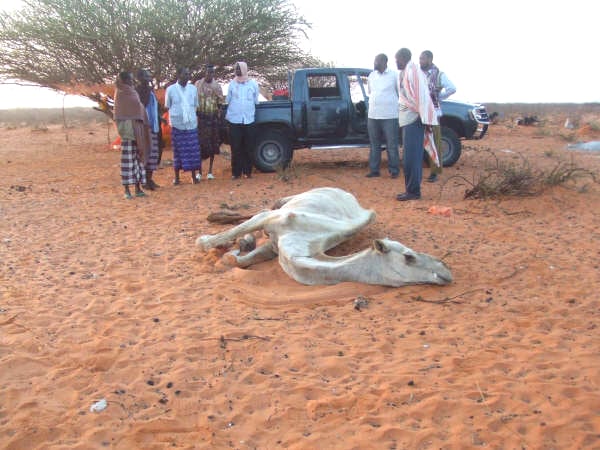"Some 42,940 sheep and goats have already died and many families have moved to urban areas in search of help," Mursal Hashi Shirwa, commissioner for social affairs of Gal-Mudug state, a self-declared autonomous region, said.
He said people would soon die if help did not arrive on time as hundreds of families were facing a bleak future after losing their livestock.
Shirwa visited the worst-affected areas from 2-6 March and told IRIN 5,500 families (33,000 people) in 40 villages north-east of the regional capital Galkayo needed immediate assistance.
He said about 100 nomadic families (6,000 people), who lost all their livestock, had moved to Bud Bud town, 175km north-east of Galkayo.
"They have nothing and nowhere to go, so they go to the closest town," he said, adding that in Qeydare, another town he visited, more people were arriving.
Livestock deaths
Yassin Mohamed Ganni, a senior elder from the area, said the situation was so bad that camels had started dying in some villages.
"Camels are the last animals to die and once they start dying, it is only a matter of time before people start dying," Ganni said.
He said urgent aid was needed to help stave off more animal deaths as livestock-keeping was the economic mainstay of the population.
|
Photo: SCDO  |
| A man provides water for his sheep, which are too weak to reach the watering hole in south Mudug, central Somalia |
"Our life depends entirely on livestock and if we lose it, then we have lost everything," Ganni said, adding that in certain cases people had lost all or two-thirds of their livestock.
Like most of central Somalia, the area has had no rain in the past two years and water points and boreholes have either dried up or are in disrepair, said Ibrahim Ilmi Ahmed, of the Somali Community Development Organization (SCDO), a local NGO that has organised water-trucks for the affected populations.
"We have been trucking water from long distances but the scale of the need and what we can deliver is not even close," Ahmed said.
He said the local business community and the administration, helped by the diaspora, had helped to bring water to some areas.
There were, however, areas "we have not been able to access largely due to distance and lack of funds", he added.
Shirwa said the Gal-Mudug administration would issue an appeal to international aid agencies to "help mitigate this unfolding catastrophe".
He said water, food and shelter for the displaced were a priority, as was restocking some of the lost livestock.
"We are appealing for immediate assistance to avert a disaster," he said.
ah/mw
This article was produced by IRIN News while it was part of the United Nations Office for the Coordination of Humanitarian Affairs. Please send queries on copyright or liability to the UN. For more information: https://shop.un.org/rights-permissions





